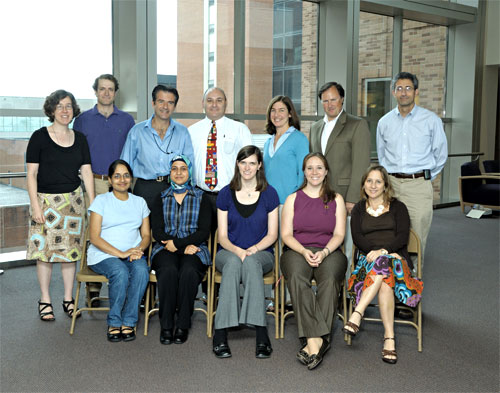You are here: Home > Pediatric Endocrinology Inter-Institute Training Program
Pediatric Endocrinology Inter-Institute Training Program

PEITP faculty and fellows, June 2009
For more than two decades, the NICHD has offered the Pediatric Endocrinology Inter-Institute Training Program (PEITP), a three-year ACGME-accredited program that leads to Board eligibility by the American Board of Pediatrics, Subboard on Pediatric Endocrinology. There are two fellowship openings per year, although occasionally funding is available for up to three fellows (the program is accredited by ACGME for three per year). The current Program Director is Dr. Constantine A. Stratakis, who is also Head of the Program on Developmental Endocrinology and Genetics (PDEGEN). The PEITP belongs administratively to PDEGEN, the largest clinical program of the Division of Intramural Research (DIR), NICHD. In September 2009, Dr. Maya Lodish joined the PEITP’s Faculty as Deputy Director.
The first year of the program emphasizes clinical patient care. The subspecialty resident spends all 12 months on clinical rotations and attends one half-day clinic at the NIH and three half-day clinics at Walter Reed Army Medical Center/National Naval Medical Center (WRAMC/NNMC), Georgetown University Hospital (GHU), Children’s National Medical Center (CNMC), and Johns Hopkins University (JHU) rotations each week. These include pediatric endocrinology and diabetes clinics and multi-disciplinary clinics in metabolic and genetic diseases, endocrine complications of oncology, metabolic bone disease (osteogenesis imperfecta, osteoporosis, etc.), and cystic fibrosis–related endocrine complications. The subspecialty resident performs the initial evaluation including history, physical examination, clinical assessment, and proposed approach. As the year progresses, the subspecialty resident assumes greater responsibility for problem delineation and therapy under the guidance of the attending staff. He/she enhances his/her teaching abilities by discussing other cases with pediatric residents or students who rotate through the pediatric endocrine clinic. The subspecialty resident also assumes continuity responsibilities for patients with chronic endocrine disorders such as diabetes, hypopituitarism, etc., and manages these patients over the entire three years of training. These continuity patients are recruited from the NICHD’s pediatric endocrinology clinic and recent hospital discharges. A number of didactic conferences are used to broaden clinical perspective and provide basic science correlation for the clinical experience. During the first year, the subspecialty resident shares responsibility with the attending staff for teaching medical students and pediatric residents on the pediatric endocrine service. He/she is expected to prepare at least one presentation/month. The subspecialty resident is expected to acquire competence in statistics. Courses are offered in biostatistics and experimental design by the Foundation for Advanced Education in the Sciences (FAES) and at the Introduction to the Principles and Practice of Clinical Research (IPPCR)—both on campus at the NICHD. All subspecialty residents take these courses in their first or second year of training unless such skills have already been acquired. This course work typically involves two hours per week of class time over five and a half months (September through mid-March). If the subspecialty resident wishes to introduce a clinical protocol for clinical research, he/she also takes the Principal Investigator Course from the NIH. This is a didactic session designed to review the pertinent Federal Codes and Regulations pertaining to human and animal research; the course also covers study design and basic statistics. Molecular biology courses are also available through the FAES; many are hands-on programs designed to familiarize the trainee with the powerful tools of molecular investigation. Subspecialty residents learn the power and pitfalls of polymerase chain reaction, DNA sequencing, immunohistochemistry, Western blots, and gene or protein data base query. Each subspecialty resident meets within the first months of his training with the Scholarship Oversight Committee (SOC) and individual project(s) are discussed and subsequently assigned.
The second year is increasingly devoted to research, with a half-day clinic per week (to maintain follow-up of continuity clinic patients) and three months on the NIH consult service as the only clinical duties. The subspecialty resident is expected to be fully engaged in a clinical or laboratory project of his/her own design that is geared toward publication. The data and productivity are monitored by the SOC. Specific expertise in most areas of research is available, including tissue culture, receptor studies, molecular biology, clinical studies, etc. The subspecialty resident may choose to perform research with any of the faculty, but a specific faculty member (mentor) will be identified by the program director as primary research advisor, usually by the middle of the first year. The mentor is responsible for providing direction in planning the project and obtaining the necessary resources and equipment. This advisor will work to ensure that the research is presented to regional and national meetings and published. For each subspecialty resident, the SOC monitors the resident’s relationship with the advisor as well as goals and accomplishments and advises accordingly. The second-year subspecialty resident will be expected to prepare presentations for the pediatric residents and staff and to lead the journal clubs and Board Review classes. One of the two second-year subspecialty residents is selected as the Representative and participates in faculty meetings and works with the Program Director on training issues. The representative serves for one year. Eleven months of the third year are devoted predominantly to research, with one month of “attending” on the pediatric endocrine service, a half-day clinic/week (for continuity clinic patients), and three months (in parallel to the resident’s research) on the NIH consult service. The third-year subspecialty resident is expected to present his/her research at one or more national meetings and to prepare his/her work for publication in a peer-reviewed journal. Grant-writing courses and career-advising sessions are also held regularly and are required for our subspecialty residents. The third-year subspecialty resident is given the opportunity to teach during his/her month of attending on the wards and clinics and to assume some departmental administrative responsibilities within the laboratories and/or clinical research activities.
Throughout their three years, all our subspecialty residents participate in the conferences that are regularly held, and their attendance is monitored as discussed previously. During their second and third years, subspecialty residents participate and present regularly at the Developmental Endocrinology Branch Research conferences, where they are asked to translate their research experience into clinical outcomes in the field of Pediatric Endocrinology.
For more information, please visit pe.nichd.nih.gov.



